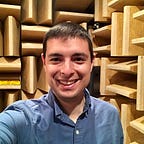How will AI Transform Work, Creativity, and Purpose?
To Christians, work is part of our human identity and our worship. So too are our inventions.
by J. Nathan Matias, Lydia Manikonda, Scott Hale, and Kenneth Arnold
This post is the fourth in a series of short introductions to artificial intelligence designed for group discussion in non-technical Christian settings. To follow the series, sign up for our email list, hosted by the Oxford Pastorate.
And God blessed them. And God said to them, “Be fruitful and multiply and fill the earth and subdue it, and have dominion over the fish of the sea and over the birds of the heavens and over every living thing that moves on the earth.” Genesis 1:28
Humans work and create because God works and creates. After creating the world, God created humans in His image and gave us work even before the fall. While work is part of sin’s curse (Gen 2:5), work is also part of our human identity and our worship. So too are our inventions.
Past technological advances reduced some jobs but created others. Many worry that AI may upset the imperfect balance of economies that tend to value a person in proportion to their labor or their wealth. Predictions on the percentage of UK, European, and US jobs that will be replaced by automation by 2030 have ranged from 5% to 30% to 50%. High estimates assume that whole jobs can be automated. More likely middle estimates are based on evidence that many jobs will be transformed, with single-purpose AIs integrating with human work. While driving is becoming automated, deliveries involve more than driving. Instead, the job is being transformed with AIs that monitor worker focus using cameras or brain-wave detecting hats.
While high-paying, skilled jobs such as investment banking are already being automated, AI will mostly affect the most vulnerable, who are central to Christianity (Matt 25). In post-Christian societies, unemployment may continue to combine with the remains of a Protestant work ethic, causing further societal damage to people’s purpose and sense of self-worth.
We can expect inequality to widen as the owners of AI systems profit from automated labor. Revenue from AI rarely reaches the people whose lives and actions make them possible. Many AIs learn with data from people who never know their data is being collected. Others are trained by workers who are typically paid below minimum wages. One Catholic digital labor theorist, Nathan Schneider, has proposed and reported on experimental digital cooperatives where the profits from an AI system are distributed across the workers who train and maintain the AI.
When we create art and poetry together with AIs, we can discover new understandings that reflect the wisdom and creativity of our Creator.
AI systems are also creative. Recent research-level AI systems can generate art, music, and language that are hard to distinguish from human creations. Where AIs can’t do creative work alone, processes like design or writing can be split into parts and distributed to digital laborers coordinated by an AI. When we create together with AIs, as one of us has done with poetry, we can discover new understandings that reflect the wisdom and creativity of our Creator.
- How can Christians respond to the changing nature of work and the effect it is having on our communities, especially the most vulnerable?
- How can Christians use AI to create new opportunities for people to serve each other?
- What effect does AI-based management have on the value and dignity of human work?
- Can Christianity clearly imagine a human identity that is not diminished if machines are able to match or exceed our abilities in producing, creating, and serving?
References
CreativeAI. (n.d.). Retrieved July 10, 2017, from http://www.creativeai.net/
Lomas, N. (2014, January 26). Read The Sonnet Co-Authored By Shakespeare, An MIT PhD Student & A Machine-Learning Algorithm. TechCrunch. Retrieved from https://techcrunch.com/2014/01/26/swift-speare/
Marsh, A. (2107, March 1). Looking to the future of future truck technology. Retrieved July 11, 2017. FleetOwner. Retrieved from http://fleetowner.com/technology/looking-future-future-truck-technology
Nelson, E., & Nelson, E. (2017.). Why American jobs are more at risk of automation than jobs in Germany or the UK. Retrieved July 10, 2017, from https://qz.com/941163/pwc-study-automation-risk-is-higher-for-american-jobs-than-for-workers-in-germany-the-uk-and-japan/
Scholz, T., & Schneider, N. (2016). Ours to hack and to own: The rise of platform cooperativism, a new vision for the future of work and a fairer Internet. OR books.
Weber, M. (2002). The Protestant ethic and the” spirit” of capitalism and other writings. Penguin.
Whitehouse, M., & Rojanasakul, M. (2017, July 7). Find Out If Your Job Will Be Automated. Bloomberg.com. Retrieved from https://www.bloomberg.com/graphics/2017-job-risk/
